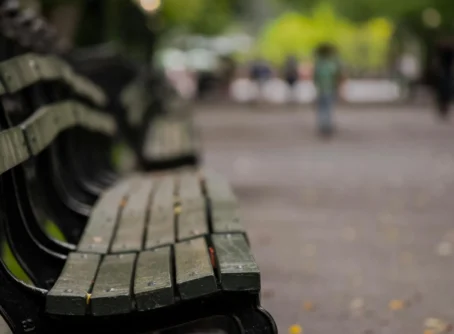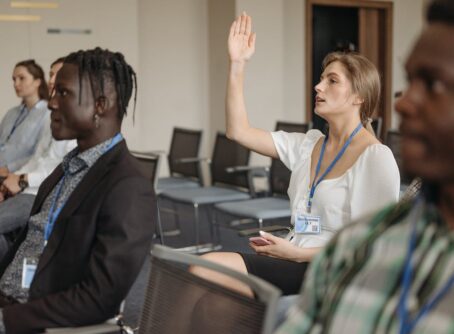
On May 22, 2021, Daryll Hayes’ name was read out loud and his picture was displayed in front of his friends and family. Unlike in his court hearing, this time his name was accompanied by cheers, a sense of pride and a diploma in Faith and Community Leadership. After 26 years in prison— five of which were spent in the Calvin Prison Initiative (CPI), his undergraduate program — Daryll Hayes became a college graduate.
Now, almost a year after his release from prison, Hayes has a diploma, but he has struggled to find employment and stable housing. “Graduation and being released from prison were the greatest days of my life,” Hayes said, “but there have been so many more challenges than I thought.” Even for CPI participants with college degrees, reentry has posed a series of struggles for returning students and graduates, as well as questions for Calvin University, the surrounding community, local organizations, and faith-based institutions.
The reentry challenges faced by released students and graduates of the Calvin Prison Initiative demonstrate the necessity of reentry networks for people returning home from prison education programs. The Calvin Prison Initiative is a five-year undergraduate program based in the Richard A. Handlon Correctional Facility in Ionia, Michigan. As an education program designed for men with life sentences or those who have at least seven years of their sentence remaining, the Calvin Prison Initiative offers a unique case-study for other prison education programs and universities considering prison education.
The first CPI student was released in 2018, necessitating that the program develop reentry, as well as in-facility, services. Today, 14 other CPI students have been released from prison and are either current students on Calvin’s main campus or graduates of CPI. Even this prison education program, which is focused primarily on lifers, has had to navigate the complexities of reentry to a much larger extent than initially envisioned. The reentry struggles of CPI highlight an important fact of prison programming for other institutions to heed: reentry care is inseparable from educational engagement with prisoners.
Prison education programs have been on the rise since the Restoring Education and Learning Act of 2019 re-established Pell Grant eligibility for incarcerated individuals in federal and state correctional institutions. Many universities and colleges across the nation are now preparing to add second campuses in prison facilities or to re-invite incarcerated learners to join their student rosters. These educational programs have a range of benefits, including transformed prison culture, lowered violent outbursts, greater political engagement and volunteerism, as well as improved health, employment, and general reentry outcomes. In fact, studies indicate that individuals who enrolled in a postsecondary education program are 48% less likely to be reincarcerated than those who did not.
A college degree alone, however, cannot shield returning citizens from the systematic exclusionary policies and stigma surrounding a criminal record.
In my research with released graduates of the CPI as part of the Hatfield Prize, I found that without institutional and social support, returning citizens who have graduated from prison education programs face similar barriers, as formerly incarcerated people that do not have a college degree. Formerly incarcerated individuals are unemployed at a rate of over 27% — a number higher than the total U.S. unemployment rate during any historical period, including the Great Depression. Even with a college degree, returning graduates are only 8% more likely to be employed after completing an academic program in prison. One graduate of CPI reported his “degree didn’t seem to matter to employers after I told them my criminal record.”
In addition to employment issues, released students and graduates of CPI also struggle with housing insecurity. For those like Daryll Hayes, who did not have family close by after his release, housing can become the “biggest stressor” post -release. Even with personal and organizational connections, CPI graduate Robert Hopkins reported that “there were times when I didn’t know where I would live or when I would have to move.” These experiences align with national trends amongst returning citizens. Across the board, formerly incarcerated people display a high rate of shelter -use and housing insecurity, leading to an elevated likelihood of recidivism.
With the complex and diverse needs of returning citizens, reentry care is a responsibility that should be shared among local nonprofits, governmental aid, houses of worship, and other social networks. However, as the institution with the longest relationship with their formerly incarcerated students, sponsoring universities possess a unique responsibility. Higher academic institutions fulfill an educational and social function as they draw together communities through their resources and social networks in seeking to form citizens.
Community networks offer essential safety nets for returning citizens; for many CPI students, Calvin University has served as their primary community upon release. For Daryll Hayes, “The CPI staff, faculty, and students became my family in prison and have supported me most in my release.” The importance of creating a place of belonging for returning students and graduates cannot be overstated. As a returning citizen and co-founder of the reentry nonprofit Fresh Coast Alliance, Nate Johnson suggests that, “Feeling a sense of belonging is half of reentry. Creating that feeling of belonging will take care of the intangible needs that aren’t being met.” Embracing returning students and graduates as important members of a university’s community is vital to their success post-release.
Additionally, universities can refer returning students and graduates to existing resources in their communities. Capitalizing on their social networks, university partners should take an active role in connecting formerly incarcerated persons with alumni to provide discrimination-free employment and housing that can accommodate parole appointments, classes and therapy schedules.
One current CPI student is now working for a Calvin University alumnus. Although he applied for other jobs, no other employer would hire him after he disclosed his criminal history. His current employer, however, has different priorities. “Our staff is 50% formerly incarcerated men,” he reported. When he told his prospective employer he was a student with the CPI, the Calvin alumnus hired him because of his faith in Calvin University and their institutional rapport in the community. The part-time student, part-time employee says his boss is “very accommodating” of my class schedule” and is “encouraging me to keep up my education even while working.”
Prison educational programs must consider their pivotal role in the reentry of their students and graduates as a natural continuation of their educational commitment to students. CPI offers institutional insight into the challenges of reentry programming and support for CPI participants. Engaging with such a vulnerable population as incarcerated learners are is important, but this action must be accompanied with an explicit commitment to CPI students’ full development both inside and outside of prison.
Emily Steen (‘23) is a recent graduate of Calvin University and a recipient of The Hatfield Prize in 2023. She studied sociology with minors in urban studies and criminology. Emily is the founder of the Calvin Peacemakers, a restorative justice club that has worked with state legislation and the Michigan Department of Corrections in partnership with the Calvin Prison Initiative.





